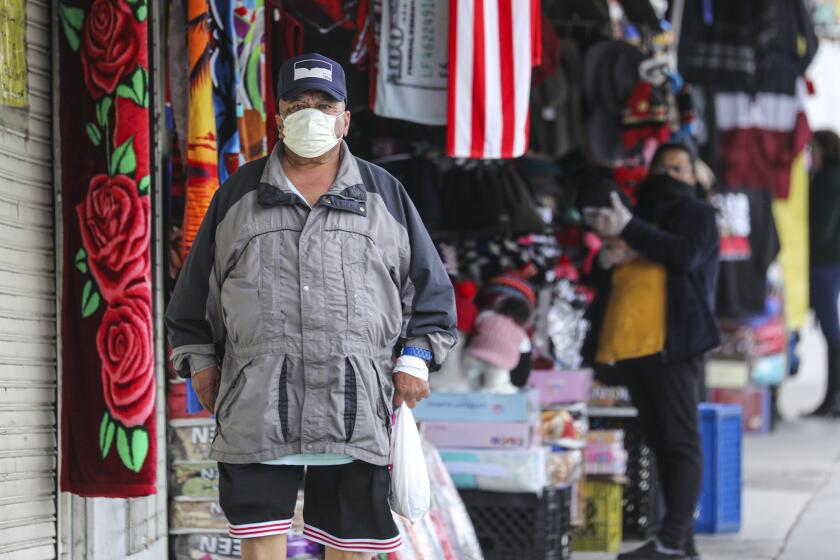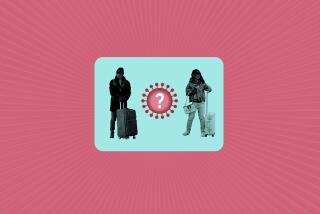Questions you should ask before canceling a trip because of coronavirus fears

One of the more difficult decisions a traveler must make is when to call it a day and cancel a trip.
It’s more fraught if the unknown factor is a virus that seems to be complicating every aspect of travel.
Here is a checklist to help you reach what you might consider a solid decision.
To get in the right frame of mind, consider these factors, said Renate Mai-Dalton, professor emerita of business at the University of Kansas who now lives in Orange County. (Full disclosure, I was a graduate student who benefited from her levelheaded approach to problems.)
Mai-Dalton would advise business executives to “take their emotions out of the discussion … search through all the facts they can get their hands on … and arrive at an informed judgment that they combine with their gut instincts and level of risk they can tolerate — and go for it.”
Get the latest coronavirus updates from our staff in California and around the world.
That risk assessment is key to travel in the time of coronavirus and every other time, said Beth Godlin, president of Aon Affinity Travel Practice, a U.S.-based travel insurance and protection program. So to begin:
What is your risk tolerance?
Be honest. When we are younger, we think we are invincible. As we grow older, we know we are not. Whenever you travel, you put yourself at risk, especially if it involves a public conveyance.
Follow-up question: If you have a low risk tolerance and you’re fretting, are you going to be OK outside your comfort zone in a time of uncertainty?
How do you react if/when things go wrong?
You may be cucumber cool, you may be a basket case or you could be somewhere in the middle. But people who react badly to the unexpected may find their ability to withstand the unexpected at a rock-bottom low.
If you were quarantined, could you stand it?
We can stand just about anything if we break it down into chunks of time. It’s not five years till I see you again; it’s just a week and then another. But the idea of being unable to control your environment may be overwhelming.
Follow-up question: If you were quarantined with a spouse, a family member, a friend or someone you’ve been paired with to hold down your costs, could you stand it or that person for a prolonged period? Or would you lose what’s left of your mind?
Does it matter to your company whether you leave and don’t return for a long time?
Tommy Weir, chief executive of tech company Enaible, canceled a flight because of the coronavirus scare, not because he was afraid of getting sick but because of potential travel restrictions that might keep him from returning to the U.S.
“If there is a risk of not making my next connection, I’m much more hesitant to take a trip,” he wrote in an email. “Just today I canceled a flight to Dubai because of the potential of not being able to return.”
Follow up question: Can you work remotely? You need to consider whether your company would allow that or whether you could, Weir said.
Are you willing to invest the time to research and keep tabs on an ever-changing story?
It can take what seems like eons of time to sort through all the information out there. If you don’t want to, no shame in saying no.
Follow-up question: Are you looking at credible sources or reacting to social media? If the latter, try switching to the Centers for Disease Control and Prevention coronavirus site, especially, Godlin said, the heat map. A quick look on Wednesday showed that much of the world is in a category called “risk of limited community transmission.”
Why is information so important?
I’m taking my cue from James Allen, whose 1903 book called “As a Man Thinketh” is considered the original self-help book. In it he wrote, “The mind is like a garden which can be cultivated or allowed to run wild. Either way, it will bring forth results.
“If seeds of intelligent thought are nurtured, they will grow into a healthful harvest. If the garden is left to chance, weed-seeds will blow in and flourish, producing nothing of use.” (The edition of “As a Man Thinketh” that I’m reading was rephrased to modern language by Sam Torode.)
It’s not always easy to judge the risk against the reward, especially when the info is bad. Amy Barzdukas, chief marketing officer for communications company Poly, told this story about a vacation she wanted to take in the Maldives. Life intervened.
“There were protests in the capital and travel was being discouraged by the State Department,” she wrote in an email. “I called the resort to check, who assured me that I would never get close to the capital and we decided to go — and it was fantastic. Now possibly finding oneself in the middle of a political protest is very different than exposure to something like covid-19, but risk/reward is still a good way to evaluate, I think.”
Is there another time you can go?
Postponing doesn’t mean not going; it just means putting it off and hoping things improve.
Follow-up question: Are you reluctant to change your plans because it’s a hassle?
It will be a bigger hassle if you get sick and/or are quarantined.
Are you reluctant to cancel because you’ll lose your vacation investment?
If yes, consider what you value, in the words of old western movies: your money or your life. But also check with your travel provider because many are now more flexible about change fees and cancellation penalties.
Follow-up question: Will insurance cover you? It might cover some things, but here’s the rub with insurance: Coronavirus is now a known threat. If you buy a policy now, you probably won’t be covered if conditions get worse and you want to cancel. The only policy that will cover you is “cancel for any reason” insurance.
That’s because most insurance covers you only for what has happened, not what might happen. The beauty of CFAR is that you get some (not all) of your money back if you decide you are afraid, don’t have the right wardrobe, find out the Louvre is closed — whatever it happens to be. Its only downside: You recoup 75% (or less) or your trip cost and will pay significantly more for the coverage.
How old are you and how’s your health?
Viruses tend to take a larger-than-average toll on the very young and very old. Likewise, a compromised immune system can place you at greater risk.
Follow-up question: If you become ill abroad, are you insured for medical care? If you use Medicare, you generally are not covered overseas. Some types of insurance do not apply abroad.
Are you dutiful about washing your hands, keeping your hands away from your face and giving people plenty of personal space?
If you’ve answered no, you’re putting yourself at risk, whether you are in the Himalayas or your hometown.
So based on all these questions, can you tell me whether it’s OK for me to go?
No. Only you can do that.
Have a travel problem, dilemma or question? Write to travel@latimes.com. We regret we cannot answer every inquiry.
More to Read
Sign up for The Wild
We’ll help you find the best places to hike, bike and run, as well as the perfect silent spots for meditation and yoga.
You may occasionally receive promotional content from the Los Angeles Times.









